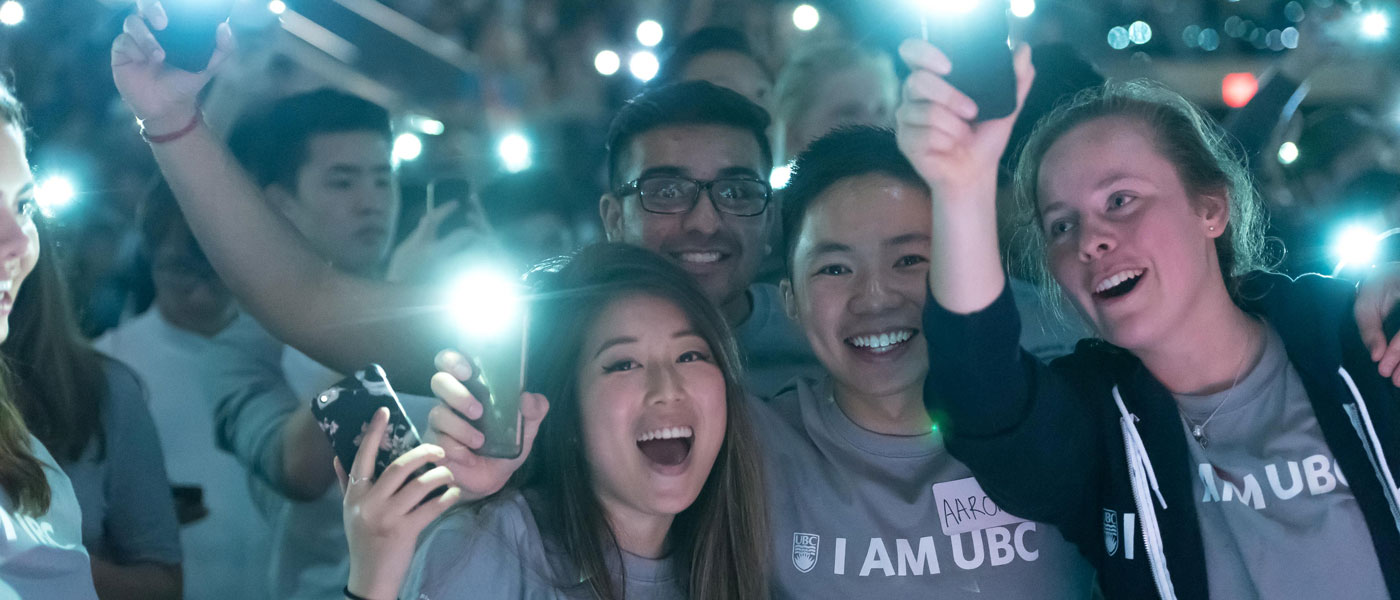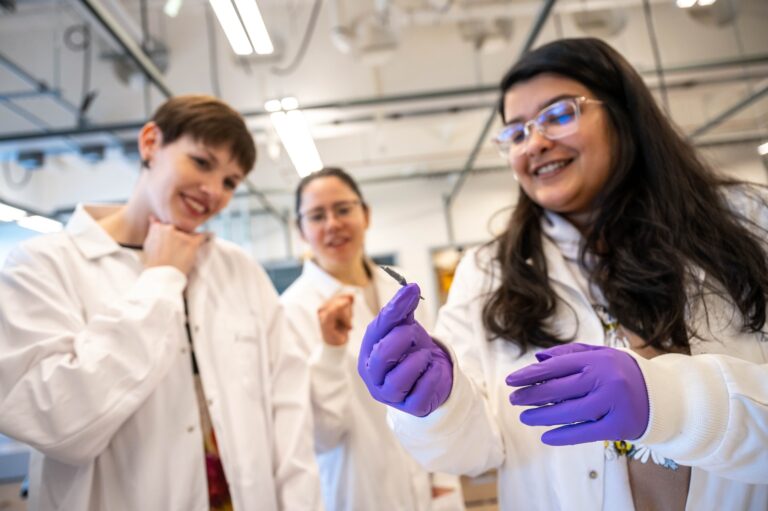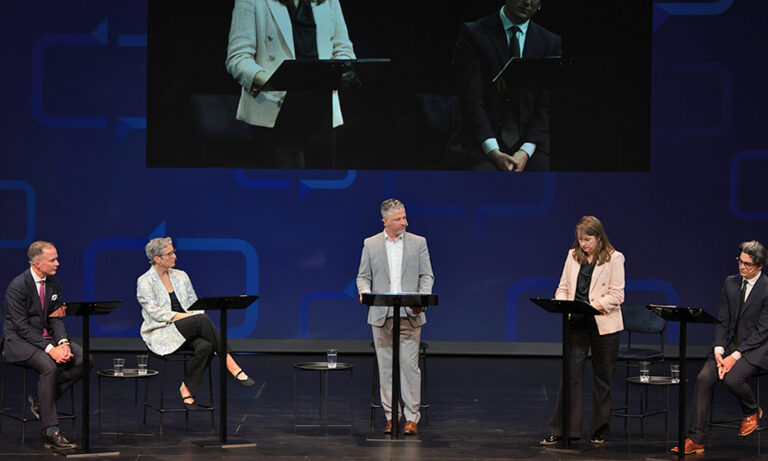Making students feel at home before classes even begin
Every September, UBC Vancouver celebrates the start of the academic year with one of the most unique and comprehensive university orientation programs in North America.

Every September, UBC Vancouver celebrates the start of the academic year with one of the most unique and comprehensive university orientation programs in North America. The university plans and hosts more than 100 welcome events, rolling out the blue and gold for thousands of new and returning undergraduate students.
According to Kim Kiloh, director at UBC’s Centre for Student Involvement and Careers, the programs make the transition to university easier for students—before the school year starts.
“We’ve created the welcome programs to address some of the challenges that come with starting university. For example, it’s typical to be intimidated by professors, so during orientation students spend time with faculty. This helps to demystify the professors, and invites students to see themselves as a part of a scholarly community that is also theirs to shape,” says Kiloh. “We want them to know—and be known by—fellow students, upper year peer mentors, and faculty from their programs. The focus is on helping new students lay a foundation that will sustain them through their time at UBC.”
Kicking off the year is Imagine UBC, which replaces the first day of class. Students attend a pep rally with more than 7,000 of their peers, and wander through the Main Event, a showcase of 300 on-campus, student-run resources, clubs and organizations. A huge variety of tours, workshops and orientation sessions are also hosted by faculty, staff and graduate students. In these more intimate settings, new undergraduate students glean advice about managing coursework, learn about academic and social supports, and explore research opportunities, student activities, and exchange and co-op programs. Returning students can attend events focused on experiential learning, career planning, research opportunities, and academic advising as well as guest lectures and alumni presentations.
[big_feature_image src=”http://news.ubc.ca/wp-content/uploads/2019/09/Imagine-Day-2880.jpg”]Thunder, the mascot of the UBC Thunderbirds, at Imagine Day.[/big_feature_image]
Students are also invited into small communities that help to foster a sense of belonging and comradery. One such program is Jump Start, which is offered to all direct-entry first-year students. The multi-day program brings together 30 students from the same academic program to spend time with a faculty member and several upper year undergraduate students during the last week of August. These learning communities meet daily, getting to know faculty, touring campus, participating in sample academic activities, and taking care of essentials such as setting up their residence rooms, finding study spots, or practicing their commute. Students begin to form friendships with people they’ll see regularly throughout their first year, providing a launching pad for their life at UBC.
Michael Griffin, a Jump Start academic director and associate professor in the classics and philosophy departments at UBC, explained how the program brings the university experience down to a human scale immediately.
“New students get to know one other and their faculty by name and face from day one,” says Griffin. “But it’s more than that: every Jump Start community is genuinely unique—a meeting-place for creative ideas, personalities, and perspectives, and a place to form lasting intellectual friendships. It’s learning for life.”
In a 2018 survey of Jump Start participants, 92 per cent said their participation in the program increased their sense of belonging at the university and their comfort in interacting with faculty members. These positive experiences are supported by research from Dr. Amori Mikami, a professor in the UBC department of psychology and a registered clinical psychologist. Her studies have shown that the social connections participants make in Jump Start predict positive academic as well social and emotional adjustment to university in their first year, contributing to students’ academic success, more positive mood, and greater feelings that attending UBC was the right choice.
“Jump Start offers students the opportunity to become comfortable and more confident on campus, very quickly,” says Kiloh. “In 2018, more than 3,200 students participated. We don’t know of any other university orientation program in North America that offers this type of experience at this scale. And it makes a difference. Students and faculty say you can spot a Jump Start attendee because they are more likely to ask a question in class, more likely to participate in class discussions, and more likely to turn up at office hours.”
When Jump Start academic director and UBC mathematics senior instructor Fok-Shuen Leung teaches his own first-year calculus class, he notices the same thing.
“Jump Start primes students for learning, so that they show up at their first class already looking to join a study group,” he says. “This has really significant downstream effects. It’s noticeable amongst the students in my own first year calculus class, and even beyond. I still run into students who I chatted with in Jump Start years ago.”
[big_feature_image src=”http://news.ubc.ca/wp-content/uploads/2019/09/Collegia-2880.jpg”]Collegia at UBC.[/big_feature_image]
Another key resource introduced to first-year students during orientation weeks is Collegia, a program intended to provide an on-campus base for students that live off-campus.
“The average commute of a UBC student is 45 minutes in each direction. It’s one of the longest student commutes in the country, and eliminates the option of going home for meals or study breaks when there’s time between classes,” says Kiloh. “Research has shown that students who live in residence are more connected to faculty, have more access to campus services, benefit from a more social environment, and find it easier to make friends. Collegia was created to ensure first-year commuter students at UBC Vancouver had access to a similarly supportive environment.”
There are four Collegia spaces located in residences and other central campus locations, with two additional spaces opening in September, 2019. Last year, more than 900 students participated in
in Collegia, which offers everything from a place to store and heat your lunch to study spaces, planned activities, and faculty office hours.
“Collegia is a ‘home away from home,’ where students can connect with other first-years, and build relationships with peer mentors and faculty,” says Kiloh. “A central goal is to foster student agency, giving every student the option to choose from the different activities to suit their own schedule and interests. Our intention is to help students become established on campus and create a community that will last well beyond their first year.”
This year, an Indigenous Students’ Collegia pilot program will be launching at the First Nations Longhouse in partnership with the First Nations House of Learning. The program will provide a dedicated space for Indigenous students to gather, exchange ideas and build community. Students will have the opportunity to join a proposed weekly traditional smudging ceremony, take part in student-led talking circles, or meet with a mentor or elder to ask advice or seek support for any problems they may be dealing with.
Margaret Moss, director of the First Nations House of Learning, hopes the program—which will be available to all undergraduate and graduate Indigenous students—will help Indigenous students build social connections and support systems on campus.
“It’s challenging for most students to come to a big university, but if you’re Indigenous, rural, or even a first generation university student, it can be especially challenging,” says Moss. “We hope this program will encourage more Indigenous students to come visit the Longhouse, see the beautiful space, and have the opportunity to meet with other students, mentors and elders who understand their culture and environment.”
According to Kiloh, UBC’s approach to orientation program satisfies the differing needs of incoming and returning students, and all are designed to make students feel not just welcomed, but at home.
“We want the very first student experiences on campus to reduce the stress that can come with starting or returning to university,” says Kiloh. “Friendships and a sense of belonging are key, and we know social and academic success go hand-in-hand. We want to make it fun, inspiring, and inclusive for everyone, which allows students to put their best foot forward right away—without worrying about all the things they may have missed or didn’t know about.
“Ours is a big campus and one rich with opportunity. These programs bring it down to a more intimate level for students who are learning to navigate all of the programs, resources and activities available to them.”



